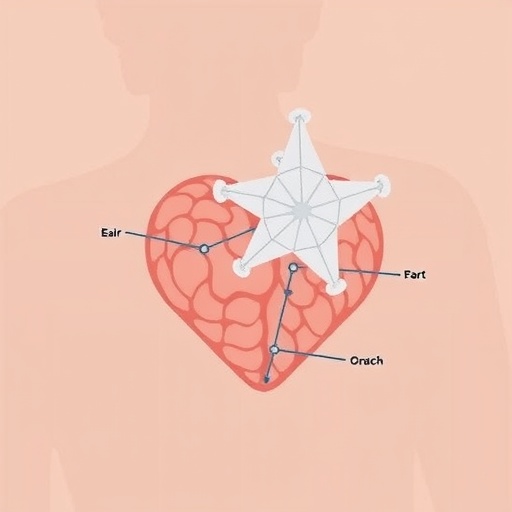A groundbreaking new study published in World Journal of Pediatrics has shed light on the profound relationship between maternal cardiovascular health during pregnancy and the neurodevelopmental trajectories of offspring within their first five years of life. Conducted by Qiu, Zhou, Hu, and colleagues, this extensive birth cohort study investigates a critical, yet often overlooked, aspect of prenatal and early childhood health—how the cardiovascular condition of mothers impacts the developing brain of their children during this highly sensitive period.
Emerging from an interdisciplinary fusion of epidemiology, pediatrics, and cardiovascular medicine, the study meticulously followed a sizeable cohort of mother-child pairs over half a decade, unraveling nuanced correlations between maternal heart health indicators and measurable cognitive, motor, and behavioral outcomes in children. Their findings disrupt traditional prenatal care paradigms by emphasizing cardiovascular wellness as a pivotal factor not just for maternal survival but for shaping early neural development with potentially lifelong consequences.
The researchers employed robust cardiovascular assessments during pregnancy, including blood pressure monitoring, echocardiographic parameters, and biomarkers indicative of vascular function and inflammation. These parameters were then correlated with a broad spectrum of neurodevelopmental metrics assessed longitudinally in early childhood. By utilizing standardized neurodevelopmental screening tools alongside sophisticated statistical modeling, the team ensured that the associations observed accounted for confounders such as socioeconomic status, maternal nutrition, and environmental exposures.
One of the most striking revelations of the study is the demonstrable link between maternal hypertension and subtle delays in offspring cognitive performance. Children born to mothers who exhibited elevated blood pressure or developed gestational hypertension showed a propensity for lower scores in language acquisition and executive functioning tests at various checkpoints from infancy through preschool age. This finding underscores not only the direct biological impacts of maternal vascular health on fetal brain development but also illuminates critical windows wherein early interventions might mitigate adverse outcomes.
Furthermore, the analysis revealed that maternal cardiovascular inflammation markers, such as elevated C-reactive protein levels, correlated with increased incidence of neurodevelopmental disorders in offspring, including attention deficit hyperactivity disorder (ADHD) and mild motor coordination difficulties. These results suggest an inflammatory cascade initiated by compromised maternal cardiovascular health that potentially disrupts the delicate processes of neurogenesis and synaptogenesis within the developing fetal brain.
Another dimension explored by the research is the effect of maternal cardiovascular resiliency—essentially the functional efficiency and adaptability of the maternal cardiovascular system during the stress of pregnancy—on neurodevelopmental outcomes. Mothers demonstrating optimal cardiovascular adaptation tended to have children with superior developmental trajectories, highlighting the protective role maternal physiological robustness plays during gestation.
The implications of this research are manifold and timely. Amid rising global cardiovascular risk profiles among women of reproductive age—exacerbated by sedentary lifestyles, obesity, and delayed childbearing—this study signals a call to action for integrating cardiovascular screenings and tailored interventions into prenatal care protocols. The findings advocate for a more holistic, systemic approach to maternal health that extends beyond traditional obstetric parameters to encompass cardiovascular dynamics as central to offspring developmental health.
On a mechanistic level, the investigators discuss the potential pathways linking maternal heart function to fetal brain maturation. These include altered uteroplacental blood flow affecting oxygen and nutrient delivery, endocrine disruptions involving stress hormones such as cortisol, and immune-mediated influences linked to systemic inflammation. Each pathway intricately intertwines cardiovascular function with neurodevelopmental biology, painting a complex picture that invites further experimental and clinical inquiry.
Importantly, the research also stresses the significance of the early postnatal environment in modulating these prenatal influences. Interventions supporting maternal cardiovascular health could synergize with enrichment strategies for children identified as high-risk, thereby providing a proactive model for optimizing neurodevelopmental outcomes. This dual approach—addressing both maternal and child factors—could revolutionize preventive pediatric healthcare.
Future research directions proposed by the authors include exploring genetic susceptibilities that may interact with maternal cardiovascular health to influence neurodevelopment. Additionally, investigating how these early life cardiovascular-neurodevelopmental dynamics play out across diverse populations and settings could refine targeted prevention and intervention frameworks tailored to specific demographic needs.
The study’s comprehensive dataset and longitudinal design represent an invaluable resource for the medical community, establishing a compelling evidence base that maternal cardiovascular health is not just a maternal concern but a foundational determinant of the neurocognitive destiny of the next generation. This challenges prior assumptions and opens new frontiers in maternal-child medicine, advocating for integrated cardiovascular-neurological health perspectives.
In clinical practice, these findings necessitate a paradigm shift wherein obstetricians, cardiologists, and pediatricians collaborate more closely to monitor and optimize maternal cardiovascular status as a standard component of prenatal and early childhood care. Such multidisciplinary efforts are essential for translating these scientific insights into tangible health benefits, potentially reducing the prevalence of neurodevelopmental delays at the population level.
Public health policies may also need reevaluation to incorporate preconception cardiovascular health optimization programs and raise awareness about the far-reaching impact of maternal cardiovascular fitness. Lifestyle interventions focusing on diet, physical activity, and stress reduction before and during pregnancy will likely become pillars of preventive health strategies aimed at improving both maternal and offspring outcomes.
In conclusion, the study by Qiu and colleagues represents a landmark contribution to our understanding of how maternal physiology intricately shapes child development. By highlighting cardiovascular health as a critical mediator of neurodevelopment, it not only advances scientific knowledge but also charts a clear course for future research and clinical innovation, ultimately aiming to nurture healthier generations through optimized maternal care.
Subject of Research: Maternal cardiovascular health and its impact on offspring neurodevelopment within the first five years of life
Article Title: Maternal cardiovascular health and offspring neurodevelopment within the first five years of life: a birth cohort study
Article References:
Qiu, H., Zhou, CY., Hu, SX. et al. Maternal cardiovascular health and offspring neurodevelopment within the first five years of life: a birth cohort study. World J Pediatr (2025). https://doi.org/10.1007/s12519-025-00969-5
Image Credits: AI Generated
DOI: https://doi.org/10.1007/s12519-025-00969-5
Tags: cardiovascular wellness during pregnancychild brain developmentcognitive development in early childhoodearly behavioral outcomeslongitudinal cohort studymaternal cardiovascular healthmother-child health studymotor skills developmentneurodevelopmental outcomespediatric cardiovascular researchprenatal care innovationsprenatal health impact





